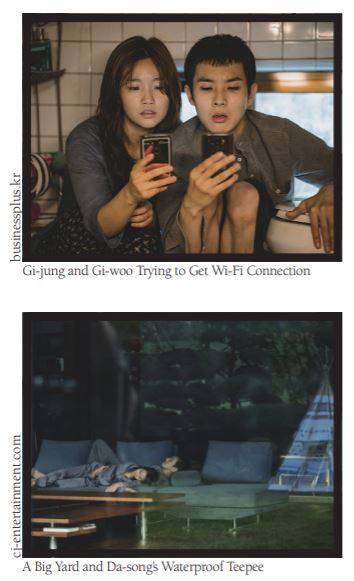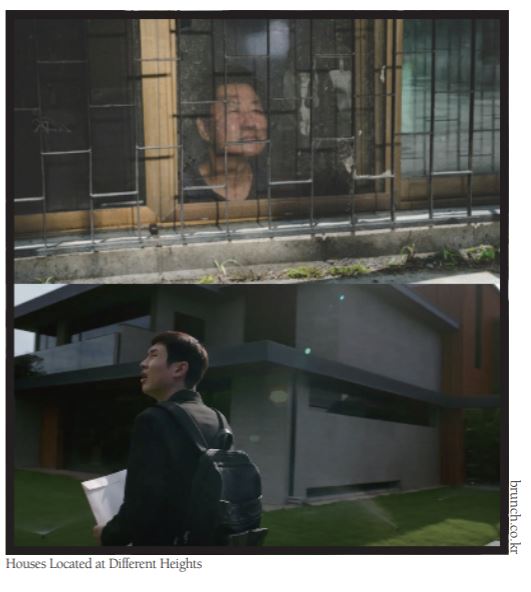Parasite is the first Korean film to win the Palme d’Or award at the Cannes Film Festival, and it is considered to have grasped two qualities: profound criticism and box office success. Parasite is a great film in that the director Bong Joon ho’s own bizarre plot is expressed with style through extraordinary actors. Thus, the SungKyun Times (SKT) tried to interpret the film and apply the film within the context of modern Korean society.
Revelation of Societal Ironies
About Parasite
Parasite is a film about the members of the Gi-taek family getting a job at Dong-ik’s house, starting with the expensive private tutoring introduced to Gi-woo by Min-hyuk, who is a friend of his. This film depicts a humorous but uncomfortable class struggle that occurs after driving out Moon-gwang, who was working as a housekeeper even before the Dong-ik family moved into the house. Parasite contains various metaphors, and one of them is the image of the descent shown by the stairs and the rainwater falling below them. Showing the image of descent is a way of indicating the differences between the upper and the lower classes. The family that is at the top of the class hierarchy is the Dong-ik family living in a house built on a high hill. The Gi-taek family’s social position is in the middle, for they live in a semi-basement house. Mun-gwang and Geun-se are a couple who live in the air-raid shelter below the basement; they are of the lowest social hierarchy.
The Height of Space and Social Class
The Gi-taek family belongs to the working class that solely relies on physical labor to make a living. Before they started working at Dong-ik’s house, their job was as simple as folding pizza boxes. They did not possess the financial capacity to accumulate enough wealth. Moreover, Gi-taek’s children, Gi-woo and Gi-jung failed the college entrance exams several times. Since no one in the family has a particular way of climbing up the social ladder, getting out of the semi-basement house seems unlikely. The toilet, which is located a little higher than the other living spaces with a few steps to climb, is a metaphor of the family’s reality. The toilet for them is the only place in the house where they can get a Wi-Fi connection and avoid a flood from the heavy rain. Ironically, the place where people relieve urine and feces is the most beneficial place for them. Even when Mun-gwang suddenly visits Dong-ik’s house on a rainy day, only to reveal the eerie secret of its house, the toilet was not flooded. Be it ever so beneficial, expecting further benefits other than Wi-Fi connection and rain avoidance from the toilet is nonsense. The toilet, located a bit closer to the ceiling, is possibly the highest place Gi-taek family can climb up in society.
Unlike the Gi-taek family, Dong-ik owns educational capital. No specific description of his educational background was provided in the film, but it can be inferred that he had received a quality higher education for he became a CEO of a global IT company at a young age. Dong-ik secures economic capital through his educational capital. Based on his economic power, his family easily accumulates wealth and enjoys nice clothes and food as an upper-class citizens. In addition to the splendid three-story house and expensive furniture, Dong-ik’s son Da-song’s waterproof toy teepee works to reveal the social gap between the two families. What is unusual about the film is that none of the Dong-ik family members ever looks down. Even when the Gi-taek family hid under the living room table, and when Gi-woo hid under Da-hye’s bed, to avoid the sudden appearance of the Dong-ik family from a disappointed camping trip, none of Dong-ik family members once glanced down. Similarly, Da-song will never have to worry about flooding due to heavy rain. It does not simply mean that he lives in a house on a high hill. He doesn’t know that a house on a low hill can be flooded when it is raining.

The Reality and Individuals
After the murder of Dong-ik, Gi-taek hides himself in the air-raid shelter where Geun-se used to live. The ending presents the most powerful scene in the film. At the end of the film, Gi-woo vows to get rich someday and rescue his father from the air-raid shelter. Gi-woo’s resolution, however, seems empty for some reason. The reason for the emptiness is because deep inside, people know that society will not change and that Gi-woo will not achieve what he wants. Although Parasite can be interpreted in various ways, the differences in life between the upper and lower classes were certainly witnessed through specific binary oppositions by the costumes, tones of speech, and the living spaces. Social classification nowadays is more extremely divided compared to that of the past. What director Bong may have wanted to discuss through the uncomfortable open ending of his work was not a fairytale-like story that calls for the awakening of class consciousness of the lower class for a better world. The cruelty that the Gi-taek family and the couple, Mun-gwang and Geun-se, showed in the film is what humans in real life can encounter. Their decisions to insult and kill each other for their comfort and survival even seem like a natural phenomenon that cannot be easily judged by simply being good and evil. Likewise, how the ending is portrayed can be seen as the director’s intention to just silently demonstrate the realistic helplessness of the absurdity of the environment. The endings that all of the characters in the film face are not a form of firm beliefs or clear answers. It is the question about the fetid odor that Dong-ik frequently smells from Gi-taek family, which cannot be eliminated by a mere change in appearance.

